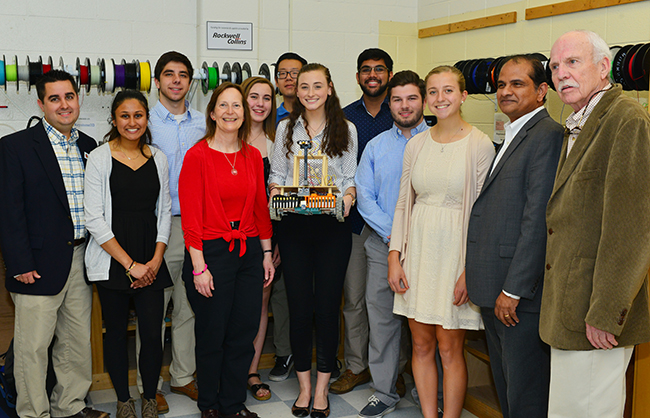
I would hope that this scholarship will take the financial burden off some of these students and continue to energize engineering education at Maryland,” says Cole. “And maybe a few will go on to teach like my father, and follow his passion for students and education.
Endowment Established to Honor Longtime Faculty Member Clifford L. Sayre, Jr.
 Marie Sayre Cole (pictured at left in red) stopped by the College Park campus last spring to see the ENES 100 Introduction to Engineering Design end of semester showcase. She planned to be in the area visiting family and friends, and was informed that the event was happening.
Marie Sayre Cole (pictured at left in red) stopped by the College Park campus last spring to see the ENES 100 Introduction to Engineering Design end of semester showcase. She planned to be in the area visiting family and friends, and was informed that the event was happening.
“It was really just luck that the two lined up. It was great to see the student showcase and the projects the teams had designed.”
ENES 100 is a required course for all first-year engineering students at the University of Maryland. The project-based course requires students to work in teams to develop a prototype over sand vehicle (OSV) capable of autonomously navigating a course and completing one of several missions. It is one of the Keystone Program courses, aimed at building a strong academic foundation in an engineering student’s first year at Maryland.
It also happens to be one of the courses that will be taught by Dr. Clifford L. Sayre Mechanical Engineering Teaching Fellows, who are supported by the funds established by Ms. Cole this past spring. The fund honors her father and longtime Maryland mechanical engineering professor Dr. Clifford L. Sayre, who passed away in 2016.
Sayre was a member of the University of Maryland faculty for over 30 years. He joined the department as an assistant professor in 1955, and received his Ph.D. in Mechanical Engineering from Maryland in 1961. During this time, he served as both the Associate Dean of Engineering (1976-1979) and Acting Chairman in Mechanical Engineering (1979).
Throughout his career, Sayre championed many programs that helped shape the department’s curriculum to this day. He advocated for increased diversity in engineering education, and had significant involvement in creating a summer program for minority scholars and women in engineering. Sayre also aided in the development of the senior capstone design course, as one of his primary focuses was the importance of experiential learning within engineering education. In fact, Cole remembers her father coming home from the capstone Design Day and talking about the different student projects he saw every semester.
Which is why, Cole says, supporting mechanical engineering teaching fellows within the Keystone Program is the perfect way to honor her father’s legacy.
According to Cole, Sayre caught the teaching bug through his own time as a teaching assistant. After serving in the United States Navy, Sayre came to Maryland and taught undergraduates while getting his Ph.D. in Mechanical Engineering. These experiences led him on the path to his future career here at the Department.
Cole wanted to give back to Maryland because her father was pivotal in the development of the educational pillars the department still stands on today. She believes creating an endowment in his name will continue the legacy that started over 50 years ago when he began as a student at Maryland.
And her hopes for the students who receive the scholarship?
“I would hope that this scholarship will take the financial burden off some of these students and continue to energize engineering education at Maryland,” says Cole. “And maybe a few will go on to teach like my father, and follow his passion for students and education.”
Top